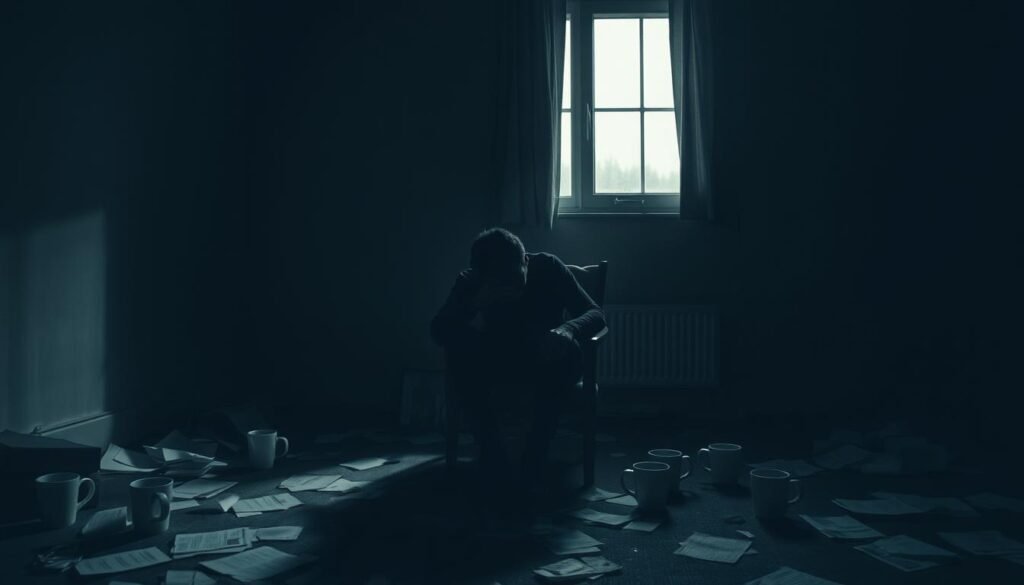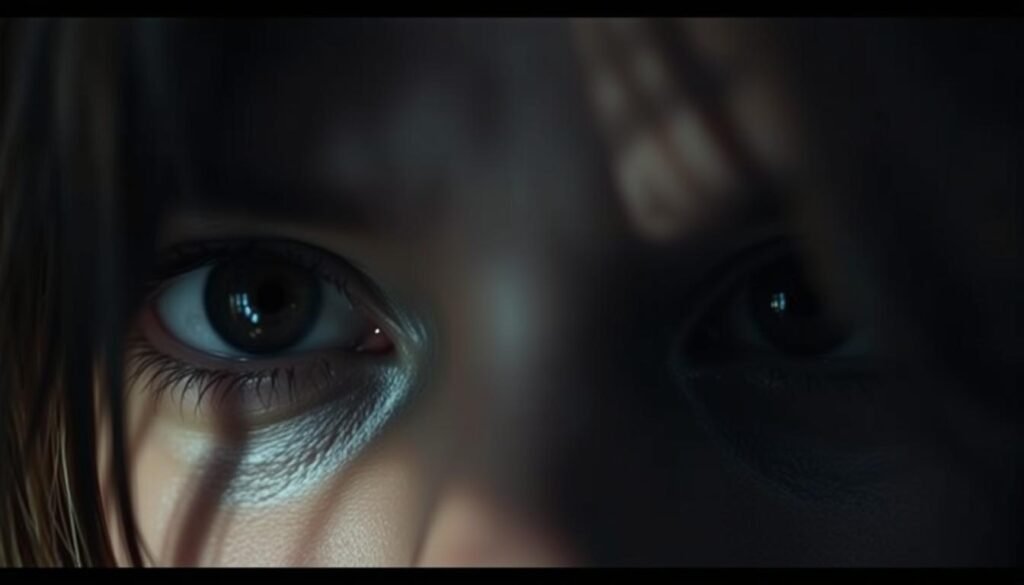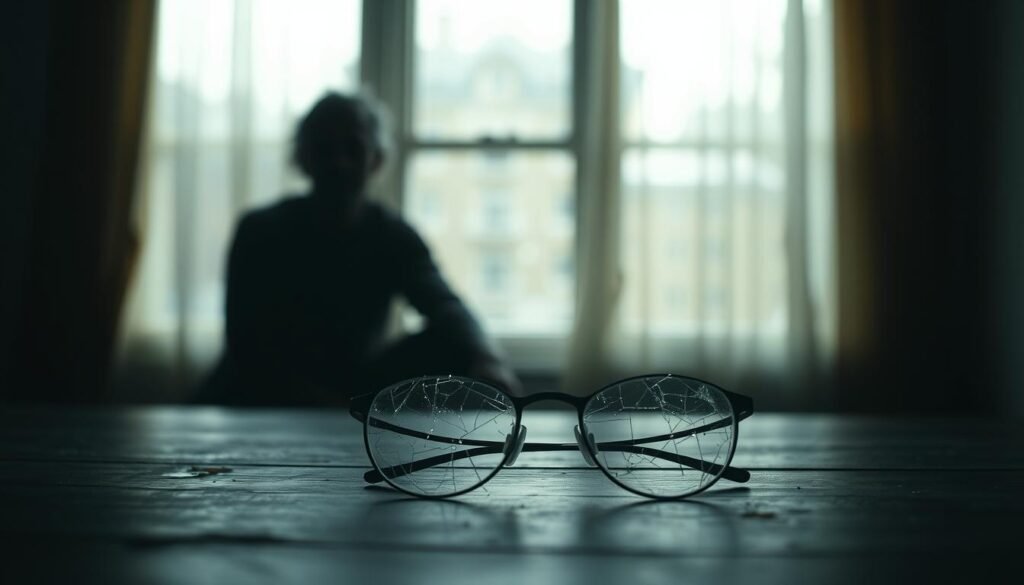In 2022, over 49,000 people in the US died by suicide. That means one person died every 11 minutes from it. This fact shows how critical it is to pay attention to mental health, especially depression signs. One such sign is the “depression dead eye,” or a blank stare, seen in those feeling deep sadness. It’s a key hint of mood issues and how they affect someone’s happiness.
It’s vital to spot symptoms like irritability, tiredness, and constant sadness early. If not treated, severe depression can cut lives short and lead to emotional and physical problems. Knowing these signs helps in seeking the right help. If you’re curious about how tiredness connects with depression, checking out fatigue signs can guide you towards recovery.
Key Takeaways
- Depression dead eye shows serious emotional pain.
- Spotting depression signs early is key for help.
- Over 90% of people with depression feel very tired.
- Sadness, irritability, and tiredness are common in emotional distress.
- Untreated severe depression can be dangerous.
Understanding Depression and Its Impact on Health
Depression is common and touches people of all ages. In 2020, more than 6% of U.S. adults had major depression. This condition affects not just the mind but also the body.
Those with depression may feel tired, eat less or more, and struggle to sleep. These signs make mental health worse and treating depression harder. For example, depression can increase heart disease risk more than smoking can. It shows how mental issues can turn into physical problems.
It’s crucial to treat both mind and body to fight depression. Getting better involves handling both mental and physical issues. To learn more, check out this informative article. Changes in lifestyle, therapy, and medicines can help reduce depression symptoms. This improves life quality significantly.
New studies show that depression can also cause long-term brain changes. That’s why starting treatment early is key to avoiding mental decline. With the right help, recovering from depression is possible. This supports both mental and physical health.
What is Depression Dead Eye?
The term “depression dead eye” refers to a look often found in people with depression. It’s like a melancholic gaze that shows little emotion. People with this issue may seem to have a distant stare.
Their eyes lack the usual signs of happiness and energy. This can be a clear sign they are not feeling well emotionally. They seem to view life in a dull way, showing they are battling inner pain.
Studies suggest not blinking as much could be linked to depression. Their eyes might look shiny, showing they might have cried, not slept enough, or just feel indifferent. The look of depression dead eye reveals their personal suffering. It asks for empathy and support from us.
Symptoms of Depression Dead Eye
It’s crucial to know the symptoms of depression for support and understanding. People facing depression might seem emotionally upset. This might change the way they act or express emotion. Their mood shifts are not just about being sad.
Common Indicators of Emotional Distress
Emotional stress from depression shows in many ways. Signs include:
- Persistent sadness or low mood
- Irritability or agitation
- A sense of hopelessness
- A pronounced lack of emotional expression, seen in their gaze
- Struggles with making decisions and focusing
These symptoms affect a person’s mindset and can be hard for loved ones to see. Knowing these signs helps us be more understanding.
Physical Symptoms Associated with Depression
Depression’s physical signs add to the emotional ones. Common ones are:
- Fatigue or chronic tiredness
- Sleep issues, like too much or too little sleep
- Appetite changes, causing weight gain or loss
- Body aches or pains without a clear cause
The connection between emotional and physical signs shows depression’s complexity. Sleep problems can worsen fatigue, creating a hard cycle to break. Recognizing these symptoms is key in treating depression fully.

| Symptoms of Depression | Emotional Indicators | Physical Indicators |
|---|---|---|
| Persistent sadness | Low mood | Fatigue |
| Irritability | Hopelessness | Sleep disturbances |
| Lack of motivation | Difficulty concentrating | Changes in appetite |
| Apathy | Isolation | Unexplained pains |
Recognizing the Melancholic Gaze
Seeing the melancholic gaze helps us understand someone’s feelings, especially if they show signs of depression. This gaze shows they are disconnecting from their environment, which means they need attention. Those with a melancholic gaze lack sparkle in their eyes, hinting at deeper unseen issues.

When you see someone with this gaze, be kind and patient with them. By addressing their gaze, you can start important talks. This lets them share their feelings and get the help they need. Recognizing these signs is key to supporting their mental health and improving their happiness.
- Identification of the melancholic gaze aids in early intervention.
- A lack of engagement often reflects the internal struggles of depression.
- Being aware of visual symptoms encourages more supportive environments.
Understanding and empathy help create a supportive community for those with depression. Being more aware turns simple observations into strong support networks. Caring about these signs of depression helps those in need and deepens our insight into mental health.
Connection Between Depression and Visual Impairments
The link between depression and visual problems is important for public health. By understanding this, we can better help those affected. Research shows a lot of people with vision loss also face depression. This calls for more study on how depression influences vision.
Research Findings on Vision Loss and Depression
Recent studies highlight the link between vision loss and depression. People with sight issues often feel more depressed. For instance, those with vision loss have an 11% depression rate. This is higher than the 5% in people without vision problems. It shows the big impact visual issues have on mental health.
Effects of Depression on Visual Perception
Depression can change how we see colors and contrasts. People with severe depression struggle more with this, especially in telling black from white. This suggests a big link between depression and vision problems. Depression makes the world seem duller, impacting life quality. This underlines the need for treatments that address both vision and depression.

Identifying Warning Signs of Severe Depression
It’s essential to know the warning signs of severe depression for quick help. Watching for changes in behavior is key since they might show deeper emotional issues. These signs can change how people act and how they connect with others.
Behavioral Changes to Watch For
Those with serious depression might have clear behavioral changes. Look out for things like:
- Increased irritability or anger
- Staying away from social activities and relationships
- Not caring about personal hygiene and how they look
- Getting too into work or sports to escape
- Using drugs or alcohol to deal with problems
Spotting these behavioral changes can start vital talks about mental health. It can motivate people to get help. For more information, check out reliable sources on depression.
Signs of Hopelessness and Despondency
Feeling hopeless and low are big emotional symptoms of severe depression. People might say things like:
- Thinking they are too much trouble for others
- Feeling like they’re not good enough
- Having no plans or motivation for the future
Finding these signs of depression is key to helping in time. It ensures people get the support and care they need.
The Role of Sleep Disturbances in Depression
Sleep problems are a big part of depression, especially insomnia. Studies show that up to 90% of people with Major Depressive Disorder have sleep issues. These can include not being able to fall asleep or feeling sleepy during the day. These issues can make feelings of sadness worse and lead to a hard cycle to break.
Impact of Insomnia on Mental Health
Insomnia is a key sign of Major Depressive Disorder. People often struggle to fall asleep or stay asleep. They also experience nightmares and poor sleep quality. This shows how important sleep is for mental health. Without good sleep, getting better is harder. Insomnia can also make depression worse, making it tricky to improve one’s mental health.
Sleeping Patterns and Their Significance
Looking at sleeping patterns offers clues about mental health. Whether it’s insomnia, sleeping too much, or erratic sleep, these signs can hint at deeper issues. Changes in sleep stages, like less deep sleep or quicker REM cycles, are linked with depression. By understanding these details, doctors can get closer to treating both sleep and mental health problems more effectively.
Seeking Help: Treatment Options for Depression
Finding the right treatment for depression is key for people wanting a balanced life. Professional help is crucial in this process. Treatment often involves therapy to deal with feelings and learn coping methods.
Medications like antidepressants are usually part of treatment. They might take weeks to work. Having a support network helps a lot in getting through tough times.
Importance of Professional Mental Health Support
The stigma of mental health can stop people from getting help. It’s critical to show the value of professional support. Knowing that depression often doesn’t go away on its own pushes people to seek treatment.
Depression symptoms can interfere with everyday life. This makes finding effective treatment crucial for doing well at work or school.
Alternative Therapies for Depression Relief
There are other ways to help with depression symptoms too. Practices like yoga, meditation, and art therapy have great benefits. They encourage expressing oneself and being mindful, aiding emotional recovery.
People trying these methods may discover new ways to cope. Combining these with traditional treatments can make a personal plan even better.
Conclusion
Spotting signs of depression dead eye shows us how complex mental health issues are. Our mental and physical health are closely linked, which underscores the need for mental health awareness. Recognizing these signs helps people understand when to seek aid, preventing the illness from getting worse.
Stories of those battling severe depression, like the pediatrician’s struggle, reveal the tough battles faced. Stigma and fear often stop people from seeking needed help. Open conversations and understanding these stories can help create a supportive community.
We must clear up false ideas about depression, showing it’s more than just being sad. Sharing stories and knowledge helps us support each other. This leads to a caring community where everyone is encouraged to get help. For more insights, look into the article on mental illness awareness.